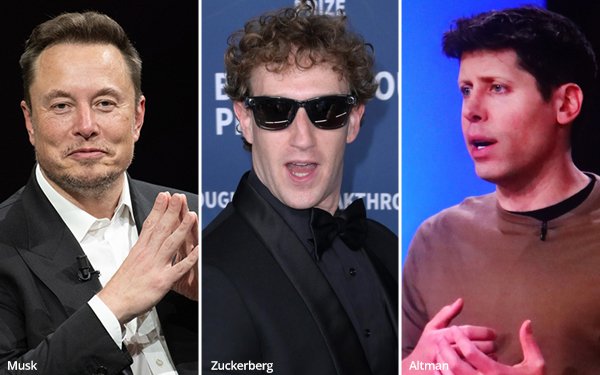
Billions are being discussed in the world of
artificial intelligence as if they represent a penny of a dollar bill -- and advertisers could be caught in the middle of the ongoing feud between OpenAI co-founders Elon Musk and Sam Altman.
The deal -- a bid for $97.4 billion for OpenAI's assets held by the non-profit -- was reportedly discussed between Musk and Meta Platforms CEO Mark Zuckerberg, with Musk attempting to get
Zuckerberg to contribute to the buy.
Musk along with a group of co-investors have submitted a near-$100 billion bid for OpenAI as a non-profit that controls OpenAI, complicating chief
executive officer Altman's attempt to convert the start-up to a for-profit entity, according to one report.
OpenAI said in a court filing on Thursday that Musk tried to enlist Mark
Zuckerberg for the $97.4 billion bid that his consortium made for OpenAI earlier this year, but he did not join Musk's fight, OpenAI wrote in a court filing made public Thursday.
advertisement
advertisement
The $97.4
billion bid was revealed as Musk, Zuckerberg and Altman are looking to pay billions to acquire AI talent.
The stability of AI platforms, which advertisers rely on, could be
affected by the ongoing conflicts.
The bid complicates Altman's plans to turn the company into a for-profit company, reports The Financial Times, but keeping it a non-profit
could complicate the ability for OpenAI to sell advertising.
While not-for-profit platforms can offer advertisers to brands similar to the way AdGood offers advertising, the advertisers need to complete
certain regulatory requirements and forms, according to an advisor.
Kevin Lee, co-founder of Didit, who has formed non-profits in the past and sold advertising on a performance and
impression basis, said it wouldn't complicate things for advertisers, but it would for OpenAI.
"It depended on if it's considered a UBIT," Lee said. "If you're a church and sell
advertising, it's unrelated to its mission. The mission is to be a house of worship. You just need to count it as an unrelated business income, which means you need to pay tax on that portion of the
income."
If the mission relates to media, it is not considered unrelated. Local non-profit radio stations, in the beginning they didn't sell advertising, it was sponsored, Lee said.
Unrelated Business Income Tax (UBIT) can apply to publishers or broadcasters — including public radio stations and religious broadcasters if the revenue they receive qualifies as
advertising income rather than qualified sponsorship.
There are non-profit magazines, newspapers and online websites publishers that are non-profits.
The Knight Foundation, for
example, has assisted in the conversion of some publishers into non-profits. This approach helps local newsrooms achieve long-term financial sustainability.
When asked why he thought Musk
wants to keep OpenAI as a non-profit, Lee said, the idea of capping compensation and providing board member governance is probably what's driving Musk.
"But he has more than just Altman to think about," Lee said. "The employees are all expecting big paydays. Nonprofit compensation tends to be capped."
Non-profits are
run by boards, rather than the CEO often due to disproportionate voting rights and shares, Lee said.
"It's sometimes tough to get into his head, because he's emotion driven," Lee said.
"I would guess off the top of my head that it's a governance thing. The CEOs of for-profits have less power."
Musk created xAI as a direct competitor to OpenAI, submitted the bid to the group
on earlier this week, Musk's attorney Marc Toberoff told the FT.
He believes the conversion to a for-profit company betrays the founding mission of the start-up, and has already
launched a lawsuit against Altman and OpenAI attempting to block the conversion.
"Meta's communications with other bidders, or internal communications, including those reflecting discussions
with Musk or other bidders, would also shed light on the motivations for the bid," OpenAI told Reuters.